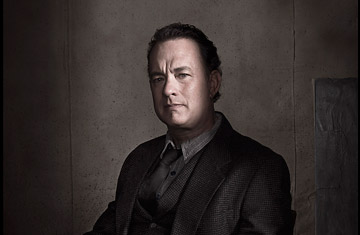
(5 of 7)
The horrors of Nixon's Vietnam War strategy hit Hanks while he was working as a bellman for the Oakland Hilton in the mid-'70s. He was often tasked with shuttling guests to and from the nearby airport. Back then he saw the charter planes that periodically arrived filled with frightened Vietnamese orphans escaping totalitarianism. Once Hanks' movie career took off with Big (1988), he desperately wanted to make a first-class Vietnam War film. But by then, a second wave of Vietnam movies was in full swing (Full Metal Jacket and Good Morning, Vietnam came out in 1987), and he couldn't see how to deal with the subject more skillfully than Francis Ford Coppola had in Apocalypse Now or Oliver Stone had in Platoon--or more thoroughly than in PBS's 11-hour 1983 documentary history. In 1994, however, Hanks brought to the screen the impact of Vietnam on his generation in the tragicomic Forrest Gump. While the role earned him an Academy Award, Gump hardly epitomized the brutal nature of Vietnam, about which reporter Michael Herr had written so devastatingly in Dispatches.
But the movie did give Hanks his eureka moment. During filming on Parris Island, he toured the Marine Corps training facilities and was impressed by the rigorous discipline the young Marines followed and the way it drew them together as a group. "Astronauts, test pilots, Army Rangers all adhere to a kind of self-government that is infectious," he says. "They become a spiritual class--part family and part competitive--that's undeniable." These are the attributes Hanks admires--and envies. "The fact is, I have no inner discipline," he says, "and Americans rigorously training to perform public service is inspiring to me."
Depicting their service became the focus of his productions--and if it tended to accompany the big victories in American history, so much the better for each story's appeal. After Apollo 13 came out in 1995, Hanks pitched From the Earth to the Moon to HBO as a hybrid of nonfiction and entertainment, and the network gave him a green light. A couple of years ago, comedian Conan O'Brien presented Hanks with the perfect spoof gift: a painting of Apollo astronauts landing in Normandy.
What differentiates Hanks from the academic past masters is his conviction that the historical experience should be a very personal one. He harbors a pugnacious indignation against history as data gathering, preferring the work of popular historians like McCullough, Ambrose, Barbara Tuchman and Doris Kearns Goodwin. He wants viewers to identify with their ancestors, allowing them to ponder the prevalence of moral ambiguity, human willpower and plain dumb luck in shaping the past. And he wants to be transported back in time, with a Sousa band banging the drum loudly.
